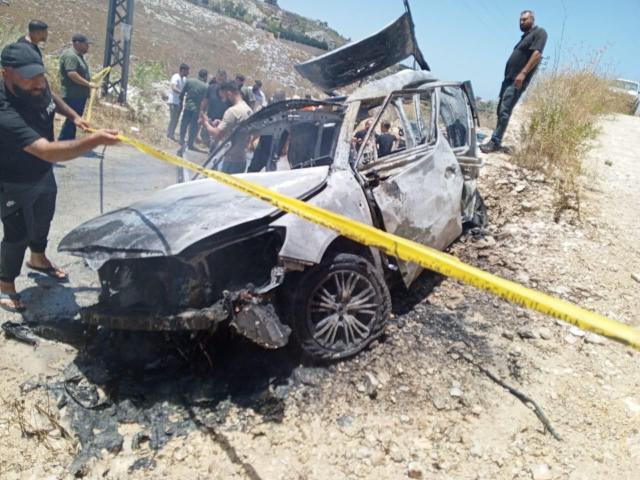The Israel Defense Forces (IDF) launched a significant offensive against Hezbollah in southern Lebanon, marking a major escalation in the ongoing conflict. In a decisive move, IDF fighter jets targeted and destroyed a Hezbollah military structure in the Yaroun area. Concurrently, IDF artillery fire effectively neutralized a looming threat to Israeli forces in the region of Amra.
On Monday afternoon, Lebanese State media reported a fatal Israeli drone strike on a vehicle in southern Lebanon. The car, reportedly traveling through the outskirts of Al-Shahabiya in the Tyre district, was hit, resulting in at least one casualty. Hezbollah later confirmed the death of one of its fighters, field commander Muhammad Motzfa Ayoub, adding to the toll that has reached 342 since last October.
🇮🇱🇱🇧- A Hezbollah terrorist was ki"ed in a drone strike in the Tzur area.
— Michael Weingardt (@Michael_Wgd) June 17, 2024
The person ki"ed in the attack on the vehicles in the Tsur area is Muhammad Motzfa Ayoub, a field commander in Hezbollah. pic.twitter.com/bQ3uH1uiVg
The Lebanese National News Agency (NNA) also highlighted an Israeli attack on the town of Khiam and reported multiple mock raids across southern Lebanon. These aggressive maneuvers underscore the heightened tensions in the area.
In response to the escalating violence, US President Joe Biden’s senior adviser, Amos Hochstein, arrived in Israel to mediate. His visit, aimed at defusing the crisis between Israel and Hezbollah, saw him engage in high-level discussions with Israeli Prime Minister Benjamin Netanyahu in Jerusalem. The Biden administration is keen to prevent the situation from spiraling into a full-blown war, reminiscent of the 2006 conflict.
Israeli IDF Air assets earlier today performed a targeted strike on a vehicle carrying a wanted Hezbollah terrorist in Selaa Lebanon.
— Edward (@DonKlericuzio) June 17, 2024
The person killed in the car attack in Selaa in southern Lebanon is Muhammad Ayoub.
He was the commander of the artillery division of the Nasser… pic.twitter.com/qDpjzSuzyK
Since the outbreak of the Gaza war in October, Hezbollah has relentlessly assaulted northern Israel. Daily exchanges of fire have forced thousands of civilians to flee their homes along the Israeli-Lebanese border. Last week's intensified Hezbollah attacks, including setting wildfires, further exacerbated the displacement crisis in northern Israel.
Washington's concerns about a serious escalation were heightened following the killing of a top Hezbollah commander by Israel. In retaliation, Hezbollah launched hundreds of rockets and drones at northern Israel. The specter of another prolonged conflict looms large as both sides continue their aggressive posturing. However, by coming to Israel to pressure and warn the Israelis about an esacalation in the north to stop the rocket fire from Lebanon, the U.S. is basically saying that they are more focused on restraining Israel from defending itself, than on restraining the Iranian proxies that have been attacking it.
This report from @ItamarEichner, who is a serious reporter, sheds light on American policy. Amos Hochstein, Biden's envoy on Lebanon, arrives in Israel today with a warning for Netanyahu: even a limited escalation against Hezbollah would be a mistake. The proper road to a… pic.twitter.com/1NsrwoeGvJ
— Mike (@Doranimated) June 17, 2024
During his visit, Hochstein held a series of crucial meetings with key Israeli officials, including Strategic Affairs Minister Ron Dermer, military secretary Maj.-Gen. Roman Gofman, and foreign policy adviser Dr. Ophir Falk. He also planned discussions with Defense Minister Yoav Gallant, National Unity Party leader Benny Gantz, opposition leader Yair Lapid, and President Isaac Herzog.
Hochstein’s diplomatic efforts come in the wake of his previous mediation in 2022, which resulted in a maritime border and natural gas agreement between Israel and Lebanon. However, the recent surge in Hezbollah's attacks on evacuated Israeli communities near the Lebanese border threatens to unravel these diplomatic gains.
Israel Defense Forces Spokesman Rear Adm. Daniel Hagari condemned Hezbollah's actions, accusing the group of jeopardizing Lebanon's future to shield Hamas. Hagari's strong words reflected the IDF's determination to protect Israeli civilians and restore security along the northern border.
Amos "haircut" Hochstein is coming here tomorrow to demand we stand down, and surrender to Hezbollah.
— Caroline Glick (@CarolineGlick) June 16, 2024
As I wrote on Friday, we have no alternative to destroying Hezbollah.
He needs to be thrown out on his ass.https://t.co/JMGXRUNYX2
Since joining the war in support of Hamas on October 8, Hezbollah has unleashed over 5,000 rockets, anti-tank missiles, and explosive UAVs at Israeli targets. This relentless aggression has resulted in significant casualties and widespread damage, displacing tens of thousands of Israelis.
Hagari warned of the potential for a wider escalation with devastating consequences for Lebanon and the region. He emphasized that Jerusalem would take all necessary measures to protect its civilians, citing Hezbollah's and Lebanon's failure to adhere to U.N. Security Council Resolution 1701. This resolution, adopted to end the Second Lebanon War in 2006, bans terrorist activities south of the Litani River.
Prime Minister Benjamin Netanyahu met today, at the Prime Minister's Office in Jerusalem, with US Presidential Special Envoy Amos Hochstein. https://t.co/PZPI0ly21f pic.twitter.com/ROn1PJ1CHS
— Prime Minister of Israel (@IsraeliPM) June 17, 2024
"One way or another, we will ensure the safe and secure return of Israelis to their homes in northern Israel. This is not up for negotiation," Hagari declared, reaffirming Israel's commitment to its national security and the well-being of its citizens.


